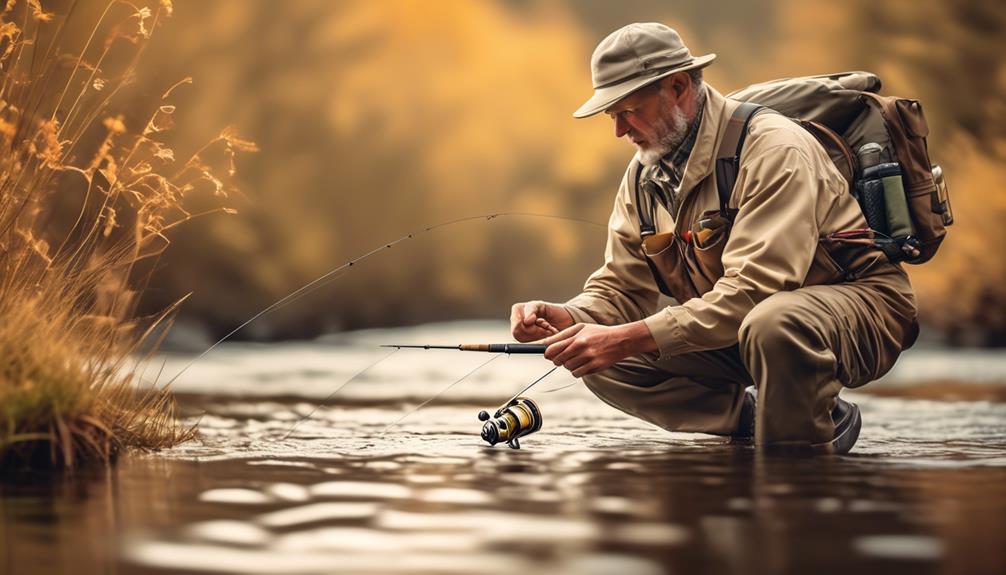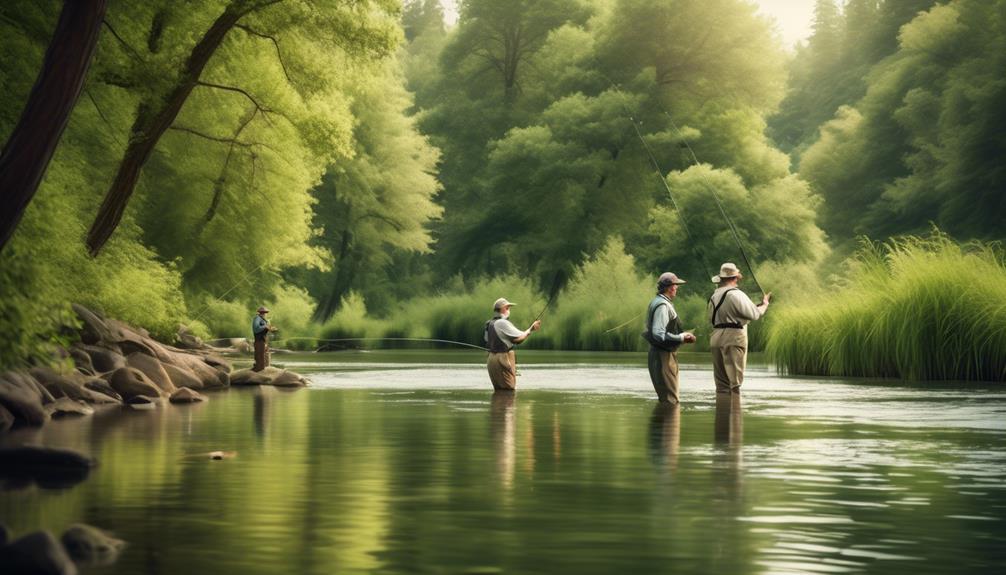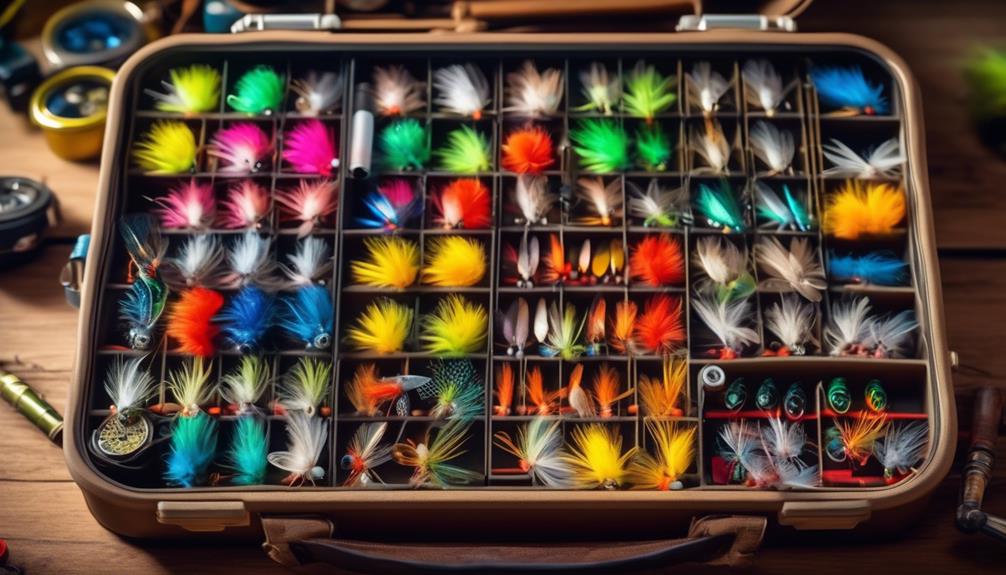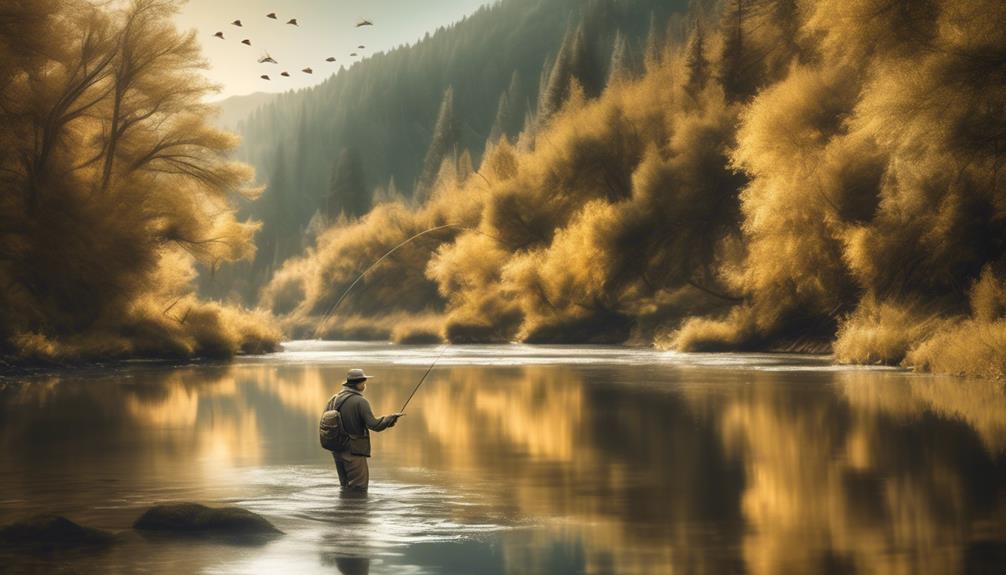When it comes to fly fishing, selecting appropriate gear is like choosing the right tool for the job. It can make or break your experience on the water.
From the type of rod and reel to the specific flies and lines you use, every piece of gear plays a critical role in your success as an angler.
But why is it so crucial? Well, let's just say that the right gear can be the difference between a frustrating day of missed opportunities and a memorable day of landing trophy fish.
So, are you ready to discover the ins and outs of selecting the perfect fly fishing gear?
Importance of Proper Gear Selection
Choosing the right gear is crucial for successful fly fishing, as it directly impacts your ability to effectively cast, present, and land fish. Proper technique and gear maintenance are essential components of successful fly fishing. When selecting your gear, it's important to consider the type of water you'll be fishing in, the size and species of fish you're targeting, and the prevailing weather conditions.
Proper technique is imperative for successful fly fishing. Even the best gear won't make up for poor casting and presentation. By selecting the appropriate gear for your skill level and the conditions you'll be fishing in, you set yourself up for success. Additionally, understanding how to properly maintain and care for your gear ensures it will perform optimally and last for many seasons. Regularly cleaning your fly line, greasing your reel, and inspecting your rod for any signs of wear are all part of good gear maintenance.
Investing in high-quality gear is important, but it's equally important to maintain and care for that gear. This not only ensures that your gear performs at its best when you're on the water, but it also extends the lifespan of your equipment. By combining proper technique with well-maintained gear, you'll be well-prepared to make the most of your fly fishing experiences.
Understanding Fly Fishing Equipment
Understanding fly fishing equipment is essential for optimizing your gear selection and ensuring successful fishing experiences. Here are three key aspects to consider when delving into the world of fly fishing gear:
- Understanding Gear Functionality: Before making any purchase, take the time to understand the functionality of each piece of equipment. Familiarize yourself with different types of fly rods, reels, lines, and flies. Knowing how these components work together won't only enhance your fishing experience but also help you make informed decisions when selecting gear.
- Choosing Appropriate Clothing: Fly fishing often involves spending extended periods in or near water. Therefore, choosing the right clothing is crucial. Look for breathable, quick-drying materials that offer sun protection. Additionally, investing in quality waders and wading boots can make a significant difference in your comfort and mobility while fishing.
- Considering Accessories: In addition to the primary gear, don't overlook the importance of accessories such as leaders, tippets, nippers, and forceps. These small items play a significant role in fly fishing and can greatly impact your overall success on the water.
Understanding gear functionality, choosing appropriate clothing, and considering essential accessories are all vital components of fly fishing equipment. By paying attention to these details, you can enhance your fishing experiences and maximize your chances of success on the water.
Impact of Gear on Fishing Success
To improve your fishing success, ensure that your gear is tailored to the specific conditions and target species you'll encounter on the water. The impact of gear on fishing success can't be overstated. Proper gear maintenance is crucial for ensuring that your equipment performs optimally. Regularly check your fly line for any signs of wear and tear, and clean your rod and reel to prevent dirt and debris from affecting their performance. Keeping your gear in top condition will directly impact your ability to execute various fishing techniques effectively.
The right gear can make a significant difference in your fishing success. For instance, using a fast-action rod when fishing small streams can hinder your ability to delicately present flies to wary trout. Similarly, using heavy tippet material when targeting finicky fish in clear water can result in fewer bites. Understanding how different gear choices impact your fishing techniques is essential for achieving success on the water.
In addition to gear maintenance and understanding how gear impacts fishing techniques, selecting the appropriate gear for the specific conditions and target species you'll encounter is essential. For example, using a heavier weight rod and a sinking fly line when fishing deep pools for large trout can greatly increase your chances of hooking into a trophy fish. Therefore, carefully consider the gear you use in relation to the fishing techniques you plan to employ and the environment in which you'll be fishing.
Matching Gear to Fishing Conditions
Matching your gear to the specific fishing conditions you'll encounter is crucial for maximizing your success on the water. This ensures that you're well-prepared to handle the challenges posed by the weather and water conditions.
When it comes to fly fishing, selecting gear that suits the specific environmental factors can make a significant difference in your overall experience and the likelihood of a successful catch.
Here are three essential factors to consider when matching your gear to fishing conditions:
- Weather Conditions: The weather plays a significant role in determining the type of gear you should use. For instance, if you're fishing in windy conditions, you'll need a heavier line and a rod with more backbone to cast effectively. On the other hand, in hot and sunny weather, it's essential to have gear that provides adequate sun protection, such as UV-blocking clothing and a wide-brimmed hat.
- Water Conditions: The type of water you'll be fishing in also influences your gear selection. In fast-flowing rivers, you may need a heavier fly line to ensure your fly reaches the desired depth, while in still waters, such as ponds or lakes, a floating line might be more suitable for presenting your fly to the fish effectively.
- Fly Fishing Techniques: Different fishing conditions may require specific fly fishing techniques. For example, if you're fishing in clear, calm waters, you may need to use delicate presentations to avoid spooking the fish, whereas in turbulent waters, a more aggressive approach might be necessary to attract their attention.
Essential Fly Fishing Gear Components
When preparing for fly fishing, it's important to ensure that you have the essential gear components to enhance your experience and increase your chances of a successful outing. Two crucial components are the fly line and wading boots.
The fly line is a fundamental piece of equipment in fly fishing. It's designed to cast the fly accurately and delicately, crucial for presenting the fly naturally to the fish. There are different types of fly lines, each suited for specific fishing conditions. For instance, a floating fly line is ideal for dry fly fishing, while a sinking line is more suitable for fishing nymphs or streamers in deeper waters. It's essential to select the right type of fly line to match the fishing conditions you'll encounter.
Equally important are wading boots, which provide stability and traction while navigating through the water. These boots are designed with felt soles or rubber soles, each offering distinct advantages. Felt soles provide exceptional grip on slippery rocks, while rubber soles are more environmentally friendly and can be easier to clean. Additionally, wading boots should provide ankle support and be comfortable for long hours of wear. Properly fitting wading boots with the right soles can greatly improve your safety and mobility in the water, allowing you to access prime fishing spots with confidence.
Advantages of High-Quality Fishing Equipment
Investing in high-quality fishing equipment can significantly enhance your overall fly fishing experience, providing numerous benefits such as improved performance and durability. When you invest in high-quality gear, you're setting yourself up for success on the water.
Here are three key advantages of using top-notch fishing equipment:
- Performance Improvement: High-quality fishing gear is designed to enhance your performance on the water. Whether it's a top-of-the-line fly rod, reel, or line, quality gear can greatly improve your casting distance, accuracy, and overall control. This means you'll be able to reach those elusive fish that are further out and present your fly in a more natural and enticing manner.
- Quality: High-quality fishing equipment is built to last. From the materials used to the construction techniques, premium gear is designed to withstand the rigors of fly fishing. This means you won't have to worry about your equipment failing you when you're in the middle of a thrilling catch. Quality gear offers peace of mind and confidence, allowing you to focus on the joy of fishing rather than the reliability of your equipment.
- Longevity: Investing in high-quality gear is an investment in the long term. While it may require a larger upfront investment, quality fishing equipment is built to last. This means you won't have to replace your gear as frequently, ultimately saving you money in the long run and ensuring that you have dependable equipment for years to come.
Selecting the Right Rod and Reel
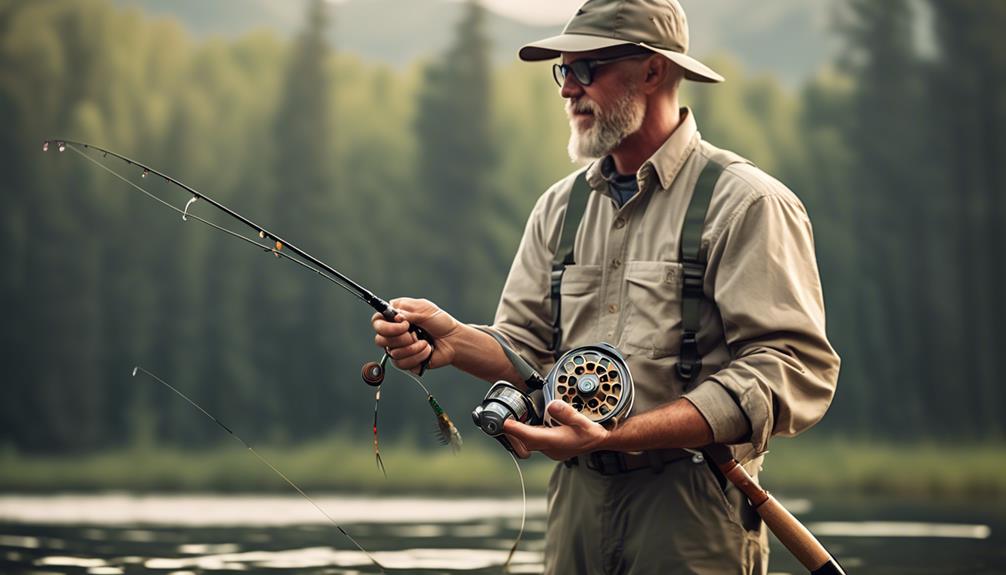
To ensure a successful fly fishing experience, it's crucial to carefully select the right rod and reel that suit your specific fishing needs and preferences.
When choosing a fly fishing rod, consider its flexibility. A more flexible rod allows for better control over the line, making it easier to cast accurately and with greater distance. On the other hand, a stiffer rod provides more power for casting into windy conditions or for throwing heavier flies. It's essential to match the rod flexibility to the type of fishing you plan to do.
Next, consider the weight of the reel. The reel weight should complement the rod's weight to achieve a balanced setup. A well-balanced rod and reel combo not only feels better in your hands but also helps with casting accuracy and line control. A heavier reel can help balance a lighter rod, while a lighter reel can complement a heavier rod, providing the right feel and control when casting.
Ultimately, the right rod and reel combination will enhance your fly fishing experience by allowing you to cast with precision, control the line effectively, and achieve the desired casting distance. Take the time to test out different rod and reel combinations to find the perfect match for your fishing style and preferences.
Ensuring Proper Gear Maintenance
Proper gear maintenance is essential for keeping your carefully selected rod and reel in top condition and ensuring they perform optimally during your fly fishing excursions. Neglecting gear maintenance can lead to premature wear and tear, affecting the performance and durability of your equipment.
To ensure your gear remains reliable and functions at its best, here are three essential maintenance practices you should incorporate into your fly fishing routine:
- Gear Cleaning: After each fishing trip, make it a habit to clean your rod and reel thoroughly. Use a gentle soap and water solution to remove any dirt, grime, or salt buildup. Pay special attention to the reel's moving parts, ensuring they're free from debris. Additionally, carefully dry your gear to prevent corrosion and rust.
- Regular Inspections: Take the time to inspect your rod and reel for any signs of damage or wear. Check the rod for cracks or fractures, and examine the reel's components for signs of corrosion. Addressing any issues promptly can prevent further damage and prolong the lifespan of your gear.
- Proper Storage: Storing your fly fishing gear correctly is crucial for maintaining its durability. When not in use, store your rod and reel in a protective case or sleeve to shield them from dust, moisture, and accidental damage. Additionally, store your gear in a cool, dry place to prevent rust and deterioration.
Frequently Asked Questions
What Are Some Common Mistakes Beginners Make When Selecting Fly Fishing Gear?
When selecting fly fishing gear, beginners often make common mistakes that impact their experience. Proper maintenance and gear storage are crucial to prolonging the lifespan of your equipment and ensuring a successful fly fishing trip.
How Does the Weight of the Fly Line Affect Casting and Fishing Success?
When casting, the fly line weight determines the rod's action and loading. A heavier line can help with longer casts, but it may spook fish in clear water. Adjust your casting technique to match the fly line weight for better fishing success.
Are There Any Specific Gear Considerations for Fly Fishing in Saltwater Versus Freshwater?
When fly fishing in saltwater versus freshwater, gear considerations are crucial. Saltwater requires corrosion-resistant equipment and heavier lines, while freshwater gear can be lighter. Both environments demand different fishing techniques, so choose your gear wisely.
What Role Does the Leader and Tippet Play in Fly Fishing, and How Do I Choose the Right One?
When choosing the right leader and tippet for fly fishing, consider the knot tying and fly presentation. Match the tippet diameter to the fly size for better fly presentation. Also, select a leader based on the fly patterns you're using.
How Can I Properly Store and Care for My Fly Fishing Gear to Prolong Its Lifespan?
To properly store and care for your fly fishing gear, keep it clean and dry after each use. Store rods in a cool, dry place, and regularly inspect lines and reels for damage. Proper care prolongs lifespan.
Conclusion
So, next time you head out for a day of fly fishing, remember the importance of selecting the right gear.
Proper gear selection can make a significant impact on your fishing success, so take the time to understand your equipment, match it to the fishing conditions, and invest in high-quality gear.
By choosing the right rod and reel and maintaining your gear properly, you can ensure a more enjoyable and successful fly fishing experience.
